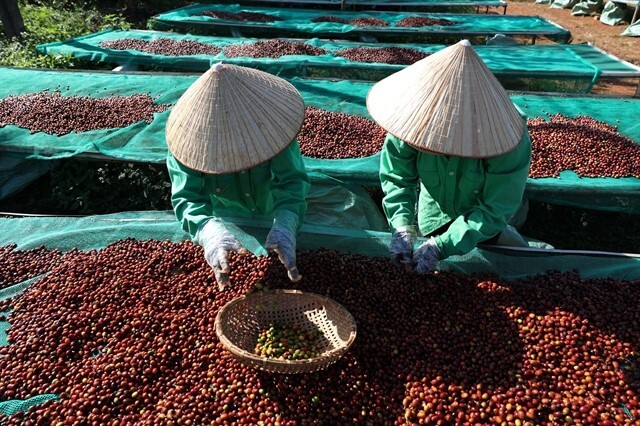The DakLak September 2nd Import-Export Company Limited (Simexco DakLak) said the UK is a strategic market for its speciality coffee products.
HCM CITY — The DakLak September 2nd Import-Export Company Limited (Simexco DakLak) said the UK is a strategic market for its speciality coffee products.
Lê Đức Toàn, its sales director in charge of the southern region, said the company exports around 100,000 tonnes of coffee beans a year, with the US, EU and China being its major markets.
Referring to the UK, he said: “We primarily export speciality coffee to the UK, averaging around 20-30 containers per year. This is a niche market for Simexco.”
Speciality coffees offer exceptionally high added value, with their prices three to four times that of regular coffees, but the cost of producing them is also significantly higher, he added.
One of Simexco's key strengths is its ability to export directly to roasters, bypassing traders in Việt Nam, which serves as a significant competitive advantage for exports.
Simexco Daklak was a pioneer in developing coffee growing zones following the EU Deforestation Regulation (EUDR) standards.
It has signed contracts for exporting EUDR-qualified coffee products, he said.
The UK-Việt Nam Free Trade Agreement (UKVFTA) has greatly helped it export to the UK, he added.
Under the UKVFTA all tariffs were eliminated in 2021 on coffee, natural honey, fruit juices, fresh flowers, and both fresh and processed fruits and vegetables exported from Việt Nam to the UK.
According to the “Connecting the UK and Việt Nam in Agriculture, Food and Drinks” report, commissioned by the British embassy in Hà Nội and done by Edelman Global Advisory, Việt Nam holds the potential to emerge as a significant supplier of products to UK retailers.
Processed products like coffee, cashew and pepper are already widely available in major UK supermarkets.
With the UK's participation in the Comprehensive and Progressive Agreement for Trans-Pacific Partnership (CPTPP), access for Vietnamese agricultural products will improve.
In recent years, Việt Nam's agricultural sector has been transitioning towards reduced emissions, adopting organic processes and harnessing renewable energy sources.
These sustainability efforts will resonate with UK consumers who prioritise origin traceability, food safety and environmentally friendly and ethically sourced goods, the report said.
Speciality coffee development
According to the Việt Nam Coffee Association, one of the key concerns of the coffee industry today is the development and promotion of speciality coffees that embody Việt Nam’s unique characteristics to enhance the supply chain’s value and global recognition.
Though Việt Nam is a major coffee exporter worldwide, the country primarily exports raw materials, which remain largely unknown among global consumers, it said.
Over the past years, Việt Nam has focused more on speciality coffees, but their proportion is only a fraction of the overall output, it added.
Under a project to develop Vietnamese specialty coffee in the 2021-2030 period that was approved by the Ministry of Agriculture and Rural Development, the area of specialty coffee is expected to account for two per cent of the country’s total coffee growing area, with an output of 5,000 tonnes in 2025,. The figures are expected to increase to three per cent and 11,000 tonnes in 2030.
Trịnh Đức Minh, president of the Buôn Ma Thuột Coffee Association, said Việt Nam is developing both arabica and robusta speciality coffees, with a stronger emphasis on the latter, given that it is the world leader in its production and export. — VNS






